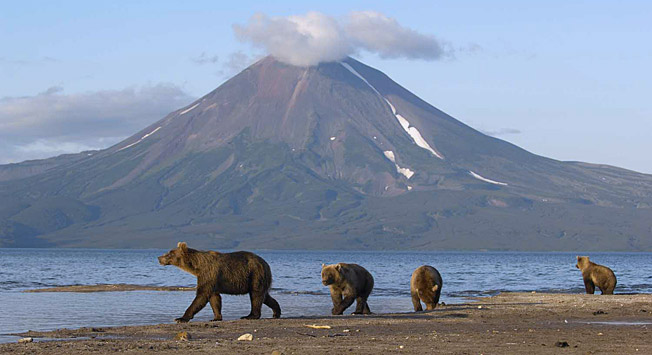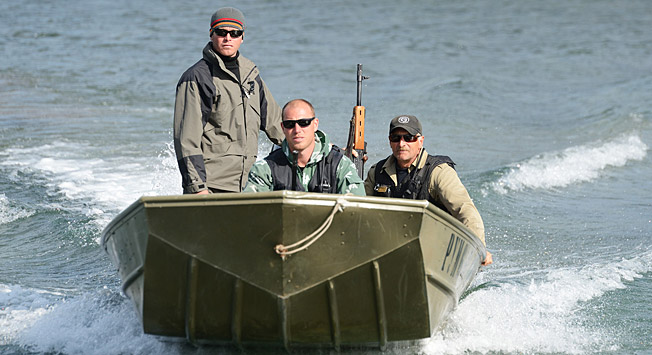Kamchatka diaries: How to meet a bear and survive

Even though I was born in Siberia, for me the bear has always been the distant master of taiga and I could not wait to see it in its natural habitat. But is it possible to survive an encounter with this formidable predator? In the Yuzhno-Kamchatsky reserve in the Russian Far East it is possible to safely observe fishing bears that come to Kurile Lake in large numbers during the salmon’s spawning season.
Photo credit: Diana Serebrennikova
Every year the reserve seeks volunteer help for the whole field season: assistance in security and scientific activities, conducting repairs and general upkeep and professional camerawork. Participating in this program not only involves active physical work, but also gives volunteers an opportunity to visit many beautiful places in the reserve, observe animals in their natural habitats and meet interesting people.
After my application was accepted on the website, I was lucky enough to become a volunteer at the Yuzhno-Kamchatsky reserve for a whole month.
According to experts’ estimations, the reserve is home to anywhere from 800 to 1000 bears. This comes as no surprise, since Kamchatka is the only region in the world that provides bears with the three main pillars of their diet: berries, cedar nuts and salmon. But even among the bears of Kamchatka the ones that live around Kurile Lake are the luckiest, as this is one of the rare places where it is possible to easily access large amounts of high-quality protein-based food.
Photo credit: Diana Serebrennikova
The lake basin serves as a birthplace for red salmon, which is considered the most valuable. Kurile Lake has the highest red salmon population in Asia. That is why brown bears feast at the lake from June until their winter hibernation. Environmental inspector and wildlife photographer Igor Shpilenok writes in his book, "Kurile Lake," that while circling the lake by boat he managed to see about 100 bears in one day.
From the diary of journalist Diana Serebrennikova
July, 31
The helicopter roared and gradually rose into the sky. However, even at that moment I was not sure that I would be at the cordon soon, as bad weather had gone on for an entire week and today it changed every hour with remarkable speed.
When finally we were in the sky, passengers pressed up against the windows to enjoy the massive scale of the conservation area. In an hour or so, the urban environment of Petropavlovsk-Kamchatsky was replaced by wild and intact nature: Tall active and dormant volcanos, meandering kilometer-long rivers and impassable forests.
Photo credit: Diana Serebrennikova
Immediately after landing, our guide warned us about bears and asked us not to separate from the group. Serious armed inspectors lead us onto the reserve, which was guarded by an electric fence.
There were a couple of small houses and a few tents on the lakeshore and a motorboat tied up at the pier. The top of the Ilyinsky volcano was visible in the distance. Splashes of water made by big fish and the cries of seagulls were heard from all sides.
Photo credit: Diana Serebrennikova
Suddenly one of the tourists shouted that there was a bear in the vicinity. A medium-sized black-brown bear slowly stepped out of the bushes 20 meters (60 feet) from us and headed to the mouth of a narrow river. The bear did not even look in our direction because fish had completely captured its attention. After catching a red salmon the bear ate it contently and disappeared into the forest.
August, 17

Photo credit: Diana Serebrennikova
It was 6 a.m. when the top of Ilyinsky volcano became visible in the first rays of the sun. Quietly stepping on the wet morning grass I went to the kitchen. I could hear tourists peacefully breathing in their tents. After making coffee, I sat down on a wooden bench and waited for the Sun to fully reach its place in the sky. Do you think I watched this sunrise alone? Not at all. A sleepy, disheveled bear came out of the bushes, walked within 10 meters from me, looked at our small camp and settled into the nearest ravine.
August, 23

Photo credit: Igor Shpilenok
Regardless of their stern appearance and isolated life among predators, the preserve’s inspectors were not reserved and unsociable. After an hour they were joking happily, discussing recent events and accepting freshly baked “blini” (pancakes). I took advantage of this break to ask them some questions about their life, which is lived so close to bears.
“How did you manage to achieve an understanding with the bears?” I asked. “I mean, you are constantly patrolling the territory of the preserve. Probably you have met bears many times under different circumstances.”
“Why should we fight?” joked Anatoly Lazarenko, one of the senior staff members. “We are working for their own good. Bears live not only by their instincts. They can think, they can evaluate different situations. And some of them even take advantage of us.” Lazarenko exchanged winks with his colleagues.
“I remember one she-bear, who saw me as an excellent nanny for her cubs,” Lazarenko continued. “At that time I was repairing a boat on the shore and every time I would start my work, the bear would come and leave her cubs with me. And she herself would swim away and fish 300 meters from the shore. If a large bear came out to the lake, the cubs would hide from it at my feet. When I would stop work for the day and leave, the mother would return and shepherd her cubs away again.”
“And there have not been any unpleasant encounters all this time?” I asked.
“Well, of course there were, you can’t get around them,” Lazarenko said. “In seven years we’ve had time to get to know many of the bears near Kurile Lake, to learn about their temperaments, behavior and habits. But some of them come here from other places and we don’t know what they have in mind, what they have been eating and if they have fallen into bear traps before. These individuals are very aggressive and they could use any opportunity to attack.”
August, 15

Photo credit: Diana Serebrennikova
Today turned out to be a very calm, cloudy day and Nikolai let me come with him to the opposite bank of the lake: he had to check the condition of the marked foot trails. Nikolai has worked in the reserve for almost three years and before that he worked on Wrangel Island for five years. He has been through struggles with white and brown bears before, so venturing into the woods with him did not frighten me at all. To avoid accidentally stumbling upon bears in the bushes, we gave ample warning about our presence: we spoke loudly, clapped our hands and sometimes Nikolai whistled and occasionally shouted “Op, op, op.”
Our path led us through the woods, and we emerged into the tundra. Bears become more aggressive here because they feel like sole masters of the place. We walked into an open area and noticed a sitting bear. It was snacking on some berries and was reluctant to go anywhere. But when we skirted it, keeping a few meters’ distance, the bear got up and followed us. Blank cartridges did not deter it, but stones that we threw around ourselves made the bear retreat.
Having survived this encounter, we emerged onto a lakeshore. Here, the bears did not show such a marked interest in us: At the rivers’ mouths the water was teeming with thousands of red fish that were ready to spawn. There were so many of them that from afar the water looked like boiling lava. Right there on a small patch of land we saw four bears, which only had to lower their paws into water to hook fish. Now, they did not even finish eating whole salmon, but were picking out only the tastiest pieces. This could only mean that very soon they would be full and would then go into the woods to look for berries and pine cones.
August, 25

Photo credit: Diana Serebrennikova
For two weeks we had been walking the same trails with bears, but one day the animals vanished entirely. Fish still splashed by the shore, but we did not see any new bear tracks around. The bears had loaded up with fish and had gone in search of berries in the tundra.
“Don’t be upset, they will surely come back at least by the end of September,” the inspectors reassured me. “And they will look much prettier: Chubbier and with thicker fur.” But I did not want to spend my last days at Kurile Lake without the locale’s central characters. Days passed. Nobody was playing under the windows of our cabin, nobody was digging under our electric fence, nobody was running around, nobody was roaring. Only seagull’s cries resounded in the mornings. I did not think I would get to say a final goodbye to the bears, but such meetings always happen when you least expect them to.
On the evening of our last day we went out to the lake, and suddenly I felt someone watching us very closely. I turned around and met its gaze. A bear was watching us in anticipation because we were standing right on the trail that led to the mouth of the river. Our small group decided not to tempt fate and slowly stepped aside. The bear continued along its way, making sure that nobody was blocking its path. It was alone, already pretty plump and had clearly been longing for fish.
I followed it with my gaze. The first one had come back. It meant that bear life would soon return to these parts.

Photo credit: Diana Serebrennikova
All rights reserved by Rossiyskaya Gazeta.
Subscribe
to our newsletter!
Get the week's best stories straight to your inbox